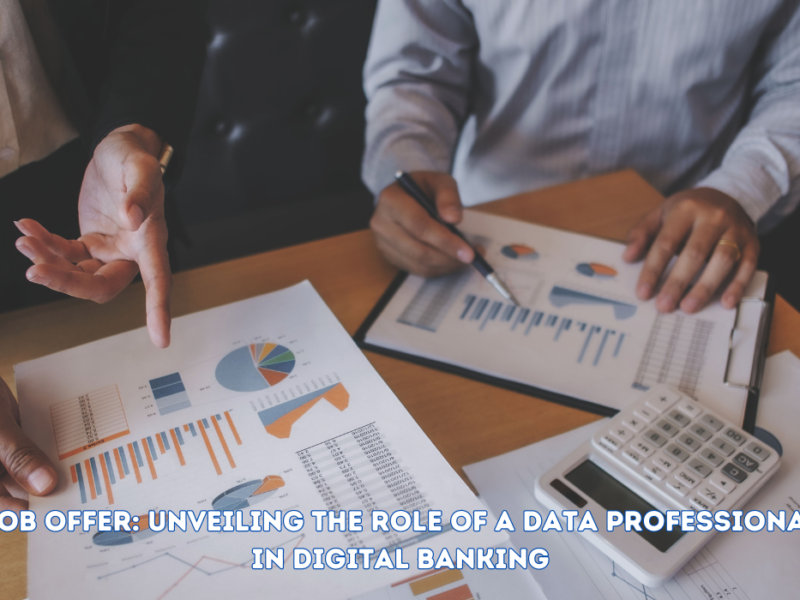Crafting a compelling narrative around the job description of a data professional in the digital banking sector requires an intricate understanding of the intersection between technology and finance. As digital banking continues to evolve, the role of data professionals becomes increasingly pivotal in driving innovation, enhancing security, and optimizing user experiences. Let’s delve deeper into the multifaceted responsibilities and qualifications that define this dynamic position.
1. Introduction: Understanding the Role
In the ever-evolving landscape of digital banking, data professionals play a crucial role in leveraging technology to address the strategic needs of financial institutions. These professionals are tasked with harnessing the power of data to drive decision-making, optimize processes, and enhance customer experiences.
2. Strategic Data Approach: Crafting the Digital Banking Landscape
A seasoned data professional brings more than just technical expertise to the table; they possess a strategic mindset that allows them to align data initiatives with the overarching goals of a digital bank. By understanding the strategic objectives and challenges faced by the institution, they can develop data strategies that drive value and innovation.
3. Building Big Data Pipelines: The Backbone of Instant Banking Services
3.1 Leveraging Real-Time Processing
In the realm of digital banking, speed is of the essence. Real-time processing capabilities enable financial institutions to offer instant banking services such as real-time transactions, fraud detection, and personalized recommendations.
3.2 Enabling Real-Time Analytics
Real-time analytics empower banks to gain valuable insights into customer behavior, market trends, and risk factors instantaneously. By leveraging robust Big Data pipelines, data professionals facilitate the seamless flow of data for real-time analysis and decision-making.
4. Mastering Cloudera CDP: Navigating the Digital Banking Terrain
4.1 Exploring Cloudera Components
Cloudera CDP (Cloudera Data Platform) serves as a comprehensive ecosystem for managing and analyzing data at scale. Data professionals must be well-versed in its various components, including Cloudera Manager, Cloudera Navigator, and Cloudera Data Warehouse, among others.
4.2 Application in a Digital Banking Environment
In the context of digital banking, Cloudera CDP enables institutions to unify data management, streamline analytics, and ensure regulatory compliance. Data professionals leverage Cloudera CDP to architect robust data pipelines that support the seamless flow of information across the banking ecosystem.
5. Sparking Innovation: Empowering Digital Banking with Spark
5.1 Harnessing Spark’s Capabilities
Apache Spark serves as a powerful framework for distributed data processing, offering speed, scalability, and versatility. Data professionals leverage Spark to perform complex analytics, machine learning, and ETL (Extract, Transform, Load) tasks in the digital banking domain.
5.2 Managing Large-Scale Data Processing
In the realm of digital banking, data volumes can be immense, and processing speed is critical. Data professionals proficient in Spark are adept at managing large-scale, high-speed data processing tasks, enabling banks to extract actionable insights from vast amounts of information.
6. Diving into Database Management: Navigating the Banking Sector
6.1 Proficiency with Hive, Impala, Kudu, HBase, and Phoenix
Database management is a core competency for data professionals in the banking sector. Proficiency with technologies such as Hive, Impala, Kudu, HBase, and Phoenix is essential for managing substantial databases and ensuring optimal performance and reliability.
6.2 Managing Substantial Databases
In digital banking, data is the lifeblood of operations, and effective database management is paramount. Data professionals are responsible for designing, optimizing, and maintaining databases that store critical financial information while adhering to security and compliance standards.
7. Orchestration Mastery: Streamlining Automated Banking Processes
7.1 Introduction to Oozie & Airflow
Orchestration tools such as Oozie and Airflow play a crucial role in automating complex workflows in digital banking. Data professionals leverage these tools to schedule, monitor, and manage data processing tasks, ensuring efficiency and reliability in banking operations.
7.2 Managing Complex Workflows
In the dynamic landscape of digital banking, workflows can be intricate and multifaceted. Data professionals adept at orchestration tools excel in designing and managing workflows that span multiple systems, applications, and data sources, streamlining banking processes and enhancing operational efficiency.
8. Kafka Expertise: Handling Real-Time Messaging
8.1 Kafka Development Skills
Apache Kafka is a distributed streaming platform that enables banks to handle high-volume, real-time messaging with ease. Data professionals proficient in Kafka development leverage its capabilities to build scalable, fault-tolerant systems for processing and analyzing streaming data.
8.2 High-Volume Messaging Management
In the realm of digital banking, real-time messaging is critical for various use cases, including transaction processing, fraud detection, and customer engagement. Data professionals skilled in Kafka are instrumental in designing and managing messaging systems that can handle high volumes of data with low latency and high reliability.
9. Navigating Data Flows: The Role of Apache Nifi
9.1 Proficiency with Apache Nifi and Nifi Registry
Apache Nifi serves as a powerful platform for managing and automating data flows in digital banking. Data professionals proficient in Nifi and Nifi Registry design and deploy data pipelines that facilitate the seamless movement of data across systems and applications, ensuring data accuracy and integrity.
9.2 Managing Complex Data Flows
In the interconnected ecosystem of digital banking, data flows can be complex and heterogeneous. Data professionals skilled in Apache Nifi excel in designing, monitoring, and optimizing data flows that span disparate data sources, enabling banks to leverage data effectively for decision-making and innovation.
10. Programming Prowess: The Languages of Digital Banking
10.1 Scala, Python, and Java Proficiency
Programming skills are essential for data professionals in digital banking, enabling them to develop and optimize data-intensive applications and algorithms. Proficiency in languages such as Scala, Python, and Java equips data professionals with the tools they need to tackle complex data challenges and drive innovation in banking.
10.2 Developing Data-Intensive Applications
In the fast-paced world of digital banking, data-intensive applications power critical banking processes, from transaction processing to risk management. Data professionals adept at programming languages excel in developing, testing, and optimizing applications that leverage data to deliver value and enhance customer experiences.
11. Skills: The Backbone of a Data Professional
11.1 Minimum 5 Years Experience in Big Data
Experience is a key differentiator in the competitive landscape of digital banking. Employers seek data professionals with a minimum of five years of experience in Big Data technologies, demonstrating a track record of success in architecting and implementing data solutions in banking environments.
11.2 Mastery of Key Technologies
Data professionals must possess a comprehensive understanding of key technologies and frameworks prevalent in digital banking, including Kudu, Kafka, HBase, Cloudera, and PySpark. Mastery of these technologies enables professionals to navigate the complex data landscape of banking and drive innovation through data-driven insights and applications.
12. Job Details: Insight into the Position
12.1 Job Location: Riyadh, Saudi Arabia
The position of a data professional in digital banking is based in Riyadh, Saudi Arabia, offering an exciting opportunity to work in one of the leading financial hubs in the Middle East.
12.2 Company Industry & Type
The employer operates in the business support services, IT services, and banking sectors, providing a dynamic and innovative environment for data professionals to thrive.
12.3 Job Role & Employment Type
The role of a data professional falls under the Information Technology domain, with opportunities for full-time employment and career growth within the organization.
12.4 Salary Range & Number of Vacancies
The salary range for the position is unspecified, reflecting the competitive nature of the role. There is one vacancy available for qualified candidates with the skills and experience to excel in the digital banking landscape.
13. Preferred Candidate: Qualifications and Experience
13.1 Required Years of Experience
The preferred candidate for this position has a minimum of four years and a maximum of fifteen years of experience in Big Data technologies, with a proven track record of success in digital banking or related fields.
13.2 Proficiency in Key Technologies
Candidates must demonstrate proficiency in key technologies such as Kudu, Kafka, HBase, Cloudera, and PySpark, along with strong programming skills in Scala, Python, and Java.
Conclusion: Pioneering Data Excellence in Digital Banking
In conclusion, the role of a data professional in digital banking is multifaceted, challenging, and highly rewarding. By leveraging their expertise in Big Data technologies, programming languages, and database management, data professionals play a pivotal role in driving innovation, enhancing security, and optimizing user experiences in the dynamic landscape of digital banking.
FAQs (Frequently Asked Questions)
- What qualifications are required for this position?
To qualify for this position, candidates should have a minimum of four years and a maximum of fifteen years of experience in Big Data technologies, along with proficiency in key technologies such as Kudu, Kafka, HBase, Cloudera, and PySpark.
- What role does programming proficiency play in digital banking?
Programming proficiency is essential for data professionals in digital banking, enabling them to develop and optimize data-intensive applications and algorithms that power critical banking processes.
- How does this job contribute to the advancement of digital banking services?
This job contributes to the advancement of digital banking services by empowering financial institutions with the tools and insights they need to innovate, enhance security, and optimize user experiences through data-driven strategies and solutions.
- What distinguishes this job from other roles in the IT sector?
This job differs from other roles in the IT sector by focusing specifically on leveraging Big Data technologies to address the strategic needs of digital banking institutions, including real-time processing, analytics, and data management.
- What growth opportunities does this position offer in the digital banking landscape?
This position offers ample opportunities for career growth and advancement within the digital banking landscape, allowing data professionals to contribute to transformative initiatives, drive innovation, and shape the future of banking through data excellence.


Comments